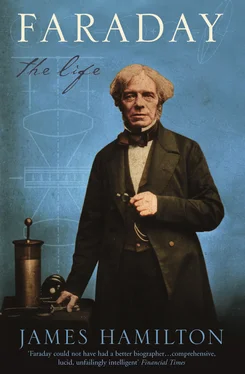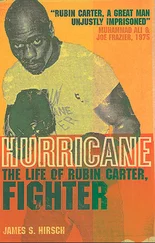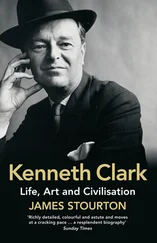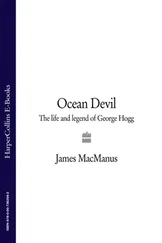– no – no – no – no – none – right – no Philosophy is not dead yet – no – O no – he knows it – thank you – ’tis impossible – Bravo.
In the above lines, dear Abbott you have full and explicit answers to the first page of yours dated Septr 28. 21
By this time, Faraday had finished writing up and binding the fair copy of the notes he had taken from Humphry Davy’s lectures in the spring. He had them ready to show Abbott on 12 September, 22as a prelude and an encouragement before taking the plunge and sending them to Sir Humphry. Riebau had suggested this course of action at the beginning of the summer, and now that Faraday looked at the product, with its half-calf leather binding and gold tooling, riffled through the pages heavy with ink and with his own effort, heard and felt the cover board close with a satisfying flop when he let it fall shut, he rejoiced in his works. Nevertheless, a certain depression and sense of reality began to settle on him. He warned Abbott that he was on a short fuse: ‘at present I am in as serious a mood as you can be and would not scruple to speak a truth to any human being, whatever repugnance it might give rise to’. 23
He wrote to John Huxtable in much the same tone. 24A reason for this was that his apprenticeship had expired, and he had just taken up a new position as a bookbinder with Henry de la Roche, of King Street, Portman Square, for one and a half guineas a week, that is thirty-one shillings and sixpence. 25De la Roche had a hot temper, ‘a very passionate disposition’, as Silvanus Thompson describes it, 26and Faraday was bitterly unhappy working for him. He wanted to leave ‘at the first convenient opportunity, despite the reasonable salary, ‘indeed, as long as I stop in my present situation (and I see no chance of getting out of it just yet), I must resign philosophy entirely to those who are more fortunate in the possession of time and means’. 27
When Faraday wrote this he understood Sir Humphry Davy still to be in Scotland with his wife. The Davys had, indeed, expected to be away from London until December, 28but the French scientist André-Marie Ampère had written to Sir Humphry from Paris with some astounding news, and this had drawn the Davys home early. Ampère, known now as a pioneer of electricity, told Davy of a new discovery that a compound of chlorine and azote (that is, nitrogen) created a highly explosive material. Indeed, its French discoverer, Pierre Louis Dulong, had already lost an eye and a finger in an explosion. Davy considered chlorine to be his gas – he had been the first to show it was an element, in the face of French belief that it was an oxide. He had named it, and he wanted to try to make the explosive himself. So, late in October, working in the laboratory of his fellow scientist John Children at Tunbridge Wells, he brought ammonium nitrate and chlorine into combination. He discovered instantly how dangerous the experiment was. A glass tube containing the chemicals blew up, shattered into tiny pieces, and badly damaged his eye. He was taken home to London immediately. 29This small explosion in Tunbridge Wells was the beginning of a chain of events that, in late October and early November 1812, caused Michael Faraday’s life to change.
Three ‘original’ sources refer to Davy’s accident and the events around it. The fullest is a long, affectionate letter written to an unknown recipient by George Riebau a year after Faraday had left his apprenticeship:
[Faraday] would occasionally call on me and expressing a wish to be introduced to Sir H. Davy, I advised him to write a letter and take his manuscript books and drawings, and leave them for Sr H.D. to examine, he did so, and next morning the Footman brought a note requesting to see him he attended. Sir H. enquired into his circumstances and told him to attend to the bookbinding and if any opportunity occurred he would think of him. Soon after this Sir H. met with an accident from the bursting some glass part of which flew into his eye, he sent for M. Faraday who transacted some business to his satisfaction … 30
Riebau shows great pride at Faraday’s youthful achievements and at his courage and dogged application to the job of finding employment in science. This, however, is the only source that specifically states that he and Davy had met before the accident. This first meeting must have been in the few days in late October 1812 between Davy’s return from Scotland and his visit to Tunbridge Wells. It also suggests that Faraday had acted promptly on Riebau’s advice to send his manuscript lecture notes to Davy after Abbott had finished reading them by 20 September. 31In an autobiographical note that Faraday’s first biographer Henry Bence Jones reprinted, Faraday corroborated much of Riebau’s account, but gave special credit to Mr Dance:
Under the encouragement of Mr Dance I wrote to Sir Humphry Davy, sending as a proof of my earnestness, the notes I had taken of his last four lectures. The reply was immediate, kind, and favourable. After this I continued to work as a book binder, with the exception of some days during which I was writing as an amanuensis for Sir H. Davy, at the time when the latter was wounded in the eye from an explosion of the chloride of nitrogen. 32
After Faraday’s brief introduction to Davy’s working practice, Davy wrote to him on 24 December 1812. Faraday treasured this letter, in which Davy had wrongly addressed him as ‘Mr P. Faraday’, and may not have shown it to anybody beyond his immediate family until he sent it to Davy’s first biographer John Ayrton Paris in December 1829. 33Davy wrote:
I am far from being displeased with the proof you have given me of your confidence & which displays great zeal, power of memory & attention.
I am obliged to go out of Town & shall not be settled in Town till the end of Jany. I will then see you any time you wish. It would gratify me to be of any service to you. I wish it may be in my power. 34
Davy’s assessment of Faraday’s competence as an emergency secretary when he was partially blinded and in need of help was a sure foundation for the success of their later collaboration. Despite his resigning from lecturing, the Royal Institution Managers would not let Davy go, and gave him an Honorary Professorship and reinstated him as Director of the Laboratory and Mineral Collection, with no salary. 35
When Faraday first made his way to the laboratory in the basement of the Royal Institution he knew he was entering hallowed ground. He saw the two parts of the room, rows of seats and the lecturer’s table on one side, and the top-lit and well-ventilated laboratory on the other. There was a prominent sand bath with a furnace attached to it, a forge, some double leather bellows, an anvil, and a blow-pipe on a table with more bellows. Further, there was a large trough of mercury which gleamed silvery in the light, some water troughs and long battery troughs with plates of copper and zinc emerging from them, and trailing wires. Then, standing about in a jumble on benches, shelves and open cupboards, there was all the romantic and evocative paraphernalia of the dedicated natural philosopher, a collection so redolent of the exploration of the unsteady edges of science that it was to Faraday as thrilling a place to enter as was the robbers’ cave to Ali Baba. It was an unruly collection of stuff: gasometers, filtering stands, glass jars and pipes, retorts, bottles and dishes in earthenware and glass, and in cupboards and the room next door delicate instruments for weighing and measuring, air pumps, balances and so on. As John Davy wrote later describing his brother’s laboratory, ‘there was no finery in it, or fitting up for display; nothing to attract vulgar admiration; no arrangement of apparatus in orderly disposition for lectures, and scarcely any apparatus solely intended for this purpose’. 36
Читать дальше












